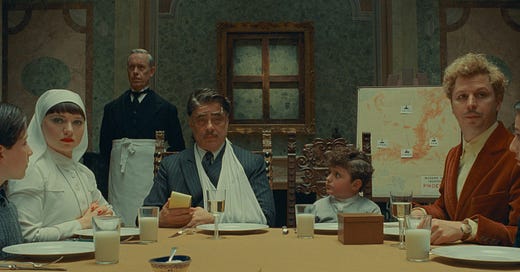Wes Anderson is back with a film that will make you laugh, hug your family, and have a serious conversation with yourself about your faith.
The Phoenician Scheme is, at its core, a family drama in the vein of Anderson’s own The Royal Tenenbaums. Zsa-Zsa Corda (Benicio del Toro), a wealthy arms dealer and industrial businessman, tries to reconnect with his daughter, a nun, Sister Liesl (Mia Threapleton). The film is laid out episodically and features a wide array of characters, as is common in Anderson’s work. By far, the standout performance goes to Michael Cera for his turn as Bjørn, finding himself sucked into Corda and Liesl’s various adventures. Each cast member—Riz Ahmed, Scarlett Johansson, Tom Hanks, Benedict Cumberbatch, and others—fits seamlessly into Anderson’s whimsical world.
All this is sounding like typical territory for Anderson. What I think separates his last two efforts (this film and 2023’s Asteroid City) is the director’s wrestling with themes of faith, God, and the unknown. Corda frequently experiences visions or dreams (shot in crisp black and white) of himself on trial in heaven for his own admittance into the afterlife. The tone overall feels cynical of the divine, but also longing for some. kind of transcendence. I’m going to explore all of the spiritual complexities of The Phoenician Scheme and Asteroid City in an opinion piece at Loud and Clear Reviews (I will edit this post with a link to the article, once it’s live). For now, what I will say is we see the honest attempt at working through these difficult ideas from one of our best, most creative artists. He does so by giving us layered characters, distinct humor, and vibrant use of color and signature symmetrical framing we’ve come to expect.
I don’t know if it’s my favorite film of the year so far, but The Phoenician Scheme struck a particular chord with me. The quirky characters, the themes it addresses, and the heart and soul it clearly reflects on the part of its maker have made it one of the most important films of the year — especially for its sincere and artful exploration of belief.
Rating: 4.5/5




